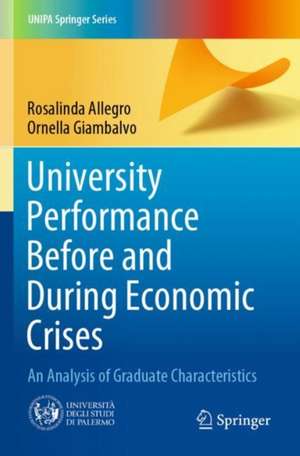University Performance Before and During Economic Crises: An Analysis of Graduate Characteristics: UNIPA Springer Series
Autor Rosalinda Allegro, Ornella Giambalvoen Limba Engleză Paperback – 25 feb 2021
| Toate formatele și edițiile | Preț | Express |
|---|---|---|
| Paperback (1) | 337.08 lei 38-44 zile | |
| Springer International Publishing – 25 feb 2021 | 337.08 lei 38-44 zile | |
| Hardback (1) | 381.98 lei 22-36 zile | |
| Springer International Publishing – 25 feb 2020 | 381.98 lei 22-36 zile |
Din seria UNIPA Springer Series
- 15%
 Preț: 637.13 lei
Preț: 637.13 lei - 15%
 Preț: 583.28 lei
Preț: 583.28 lei - 5%
 Preț: 722.48 lei
Preț: 722.48 lei - 15%
 Preț: 653.00 lei
Preț: 653.00 lei - 15%
 Preț: 581.14 lei
Preț: 581.14 lei - 15%
 Preț: 640.37 lei
Preț: 640.37 lei - 15%
 Preț: 638.24 lei
Preț: 638.24 lei - 15%
 Preț: 638.89 lei
Preț: 638.89 lei -
 Preț: 386.99 lei
Preț: 386.99 lei - 15%
 Preț: 636.94 lei
Preț: 636.94 lei - 18%
 Preț: 791.09 lei
Preț: 791.09 lei - 20%
 Preț: 448.30 lei
Preț: 448.30 lei -
 Preț: 379.86 lei
Preț: 379.86 lei -
 Preț: 380.25 lei
Preț: 380.25 lei - 24%
 Preț: 734.67 lei
Preț: 734.67 lei - 5%
 Preț: 918.61 lei
Preț: 918.61 lei - 18%
 Preț: 881.71 lei
Preț: 881.71 lei - 15%
 Preț: 638.11 lei
Preț: 638.11 lei - 15%
 Preț: 519.32 lei
Preț: 519.32 lei -
 Preț: 260.77 lei
Preț: 260.77 lei - 15%
 Preț: 642.03 lei
Preț: 642.03 lei - 15%
 Preț: 640.24 lei
Preț: 640.24 lei - 15%
 Preț: 689.97 lei
Preț: 689.97 lei -
 Preț: 379.68 lei
Preț: 379.68 lei - 18%
 Preț: 993.60 lei
Preț: 993.60 lei - 18%
 Preț: 957.13 lei
Preț: 957.13 lei - 18%
 Preț: 724.63 lei
Preț: 724.63 lei - 15%
 Preț: 641.20 lei
Preț: 641.20 lei
Preț: 337.08 lei
Nou
Puncte Express: 506
Preț estimativ în valută:
64.50€ • 67.52$ • 53.37£
64.50€ • 67.52$ • 53.37£
Carte tipărită la comandă
Livrare economică 02-08 aprilie
Preluare comenzi: 021 569.72.76
Specificații
ISBN-13: 9783030361440
ISBN-10: 3030361446
Pagini: 71
Ilustrații: XI, 71 p. 5 illus.
Dimensiuni: 155 x 235 mm
Ediția:1st ed. 2020
Editura: Springer International Publishing
Colecția Springer
Seria UNIPA Springer Series
Locul publicării:Cham, Switzerland
ISBN-10: 3030361446
Pagini: 71
Ilustrații: XI, 71 p. 5 illus.
Dimensiuni: 155 x 235 mm
Ediția:1st ed. 2020
Editura: Springer International Publishing
Colecția Springer
Seria UNIPA Springer Series
Locul publicării:Cham, Switzerland
Cuprins
1 Introduction.- 2 About Overeducation and Mismatching.- 3 Methodology.- 4 Data.- 5 Main Results.- 6 Comments and Final Remarks.- 7 Appendix A: Matrices of Aggregated Concordance Indices.- 8 Appendix B: Matrices of Outranking Credibility Indices.
Notă biografică
Rosalinda Allegro received her PhD from the University of Palermo and currently works as a statistician at the Istituto Zooprofilattico Sperimentale della Sicilia (Experimental Zooprophylactic Institute of Sicily) in Palermo. She has previously worked at the Department of Economic Science, Business, and Statistics at the University of Palermo and in public and private companies as a statistical consultant. Her work focuses mainly on Quantitative Social Research and Biostatistics and she is co-author of scientific papers in these fields. This book is one of the outcomes of her activity at the University of Palermo.
Ornella Giambalvo is Full Professor in the Department of Economic Science, Business, and Statistics at the University of Palermo. Her work focuses mainly on social statistics, sampling surveys, the construction of statistical indicators, and studies on statistical education. She is referent for the University of Palermo in the AlmaLaurea interuniversity consortium, with responsibility for collecting survey data for the assessment units and the committees dealing with teaching activities and career guidance. She is a member of both the AlmaLaurea Scientific Committee and the CRUI (Italian Conference of Rectors) Scientific and Technical Committee for Soft Skills. This book is one of the outcomes of her activity on these scientific committees.
Ornella Giambalvo is Full Professor in the Department of Economic Science, Business, and Statistics at the University of Palermo. Her work focuses mainly on social statistics, sampling surveys, the construction of statistical indicators, and studies on statistical education. She is referent for the University of Palermo in the AlmaLaurea interuniversity consortium, with responsibility for collecting survey data for the assessment units and the committees dealing with teaching activities and career guidance. She is a member of both the AlmaLaurea Scientific Committee and the CRUI (Italian Conference of Rectors) Scientific and Technical Committee for Soft Skills. This book is one of the outcomes of her activity on these scientific committees.
Textul de pe ultima copertă
This book briefly analyzes the performance of selected Italian universities during a pre-crisis period and an economic crisis period, on the basis of graduate characteristics and graduate placement statistics. The Electre model is used to produce eighteen university rankings according to three different scenarios (Neutral, University, and Job), three different roles ascribed to the key criteria (overeducation and mismatching), and two years corresponding to two postgraduation placement sampling surveys carried out in a pre-crisis period (2006) and during a crisis period (2011). The eighteen rankings are based on Economics/Statistics and Political & Social Sciences graduates. The rankings vary according to both the scenarios considered and graduate characteristics. Some differences are noted between the two fields of study. The book will be of interest for statisticians interested in evaluation issues, policymakers concerned with university comparisons and rankings, and future studentsand graduates wishing to make the best choice when selecting their university course. In addition, the new methodology adopted will be relevant for scholars in Statistics and Engineering.
Caracteristici
Analyzes Italian university performance in pre-crisis and crisis periods basing on certain graduate characteristics Focuses on mismatching and overeducation among Italian graduates Illustrates application of the Electre model within the social sciences
